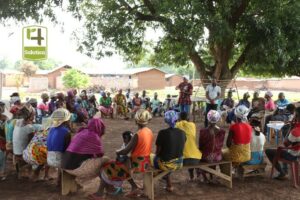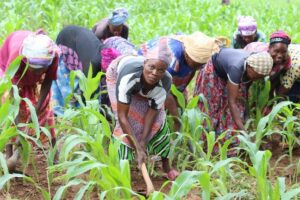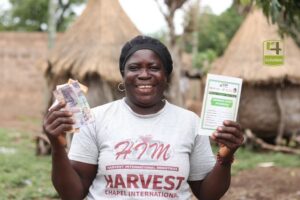“I will be lying If I said 4R cooperative has not benefited us and the entire community. Our lives have improved significantly.” – Cooperative Chairman Kito Nkwanta.
Forming cooperatives is one of the approaches the 4R Nutrient Stewardship Project uses to engage smallholder farmers in Northern Ghana. These cooperatives consist of husband and wife, the youth, and the aged in the operational areas.
 With the rise in COVID cases, lockdowns and fewer gatherings hit smallholder farmers with limited access to input and markets to cultivate their crops and sell. Moreover, in the last few months, the prices of goods and services have skyrocketed, thus challenging the smallholder farmers in Ghana.
With the rise in COVID cases, lockdowns and fewer gatherings hit smallholder farmers with limited access to input and markets to cultivate their crops and sell. Moreover, in the last few months, the prices of goods and services have skyrocketed, thus challenging the smallholder farmers in Ghana.
But as the African proverb goes – “A broomstick can easily be broken, but when broomsticks are tied together to become a broom, will bend but will not break”.
The 4R Cooperatives in Ghana is now supporting the communities with access to tractor services which has been a major challenge in the communities for years. Members now come together and collectively add up the acreage they want to plow, and then engage service providers to do the plowing. This approach is inviting service providers to offer their services to cooperatives. This is the same approach cooperative members use to purchase seeds, chemicals, and fertilizers as the cropping season approaches.
As cooperatives on the 4R project, the Village Savings and Loans model has been incorporated into their operations. This model is where smallholder farmers save their petty cash (GHC-GH2) in their cooperative boxes for a period. Then, when it is time to share, money is distributed based on everyone’s contribution for the agreed period.
 This model ensures that the smallholder farmers generate income internally to support their households. In addition, through this model, some cooperatives have access to production loans from Salaga farmers’ cooperative credit unions for their group farming operations and have paid back after aggregation. They use their VSLA contributions as collateral to access these loans from the credit unions.
This model ensures that the smallholder farmers generate income internally to support their households. In addition, through this model, some cooperatives have access to production loans from Salaga farmers’ cooperative credit unions for their group farming operations and have paid back after aggregation. They use their VSLA contributions as collateral to access these loans from the credit unions.
Farmers have learned their way around access to markets. Now, cooperative members collectively add their produce and aggregate to high-value markets. Earlier, each farmer had to find a buyer and mainly was cheated because they were anxious to sell their produce and the buyer determined the prices.
 The Village Savings and Loans model has helped strengthen the 4R cooperatives here in Ghana. Members are taking loans from their group’s savings to solve personal household issues (like healthcare, school fees, and other basic needs). Most women in the operational communities are into petty trading and businesses through the 4R Cooperatives. They have to pick loans from their cooperative groups to start trading. Some have started selling fish in their communities, others are into aggregation, and some have chosen loans to boost their businesses and increase quantities of their goods.
The Village Savings and Loans model has helped strengthen the 4R cooperatives here in Ghana. Members are taking loans from their group’s savings to solve personal household issues (like healthcare, school fees, and other basic needs). Most women in the operational communities are into petty trading and businesses through the 4R Cooperatives. They have to pick loans from their cooperative groups to start trading. Some have started selling fish in their communities, others are into aggregation, and some have chosen loans to boost their businesses and increase quantities of their goods.
4R Cooperatives in Ghana serve as a “safe space” for members of the group who have issues and need advice and solutions. In addition, members meet to discuss matters that would advance their group activities and bring development to their communities. As a result, 4R cooperatives are improving the socio-economic well-being of smallholder farmers in Northern Ghana.